Aggregate of Freelance Economy Statistics
MOST COMMONLY USED STATS
The freelance economy is a $5.4 trillion dollar market (SIA) – “The global gig economy posted an estimated $5.4 trillion in revenue in US dollars during 2021″.
Freelancer Population Stats
12% of the global labor force is participating in online freelance work. (Working Without Borders: The Promise and Peril of Online Gig Work)
72.1 million Americans are freelancing today, about 45% of the workforce (MBO, State Of Independence, 2023)
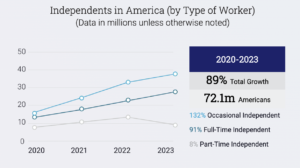
- 86.5 MIL. Of the US workforce will be independent freelancers by 2027 (STATISTA)
- 26 mil full time freelancers in 2023 (MBO, State Of Independence, 2023)
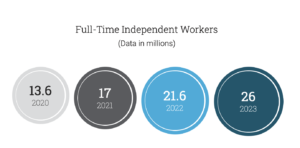
- 78% plan to keep working independently (MBO, State Of Independence, 2023)
- 4.6 mil are making over $100,000 (MBO, State Of Independence, 2023)
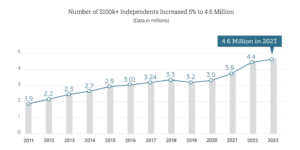
- 51% of freelancers say no amount of money would convince them to return to a traditional job (Upwork)
- Company Stats
- NASA Company KPI’s:
- Skills of freelancers have met or exceeded expectations in 92% of projects
- 80% Cost Savings
- Traditional procurement for NASA and other US federal agencies takes on avg 9-12 months, with NASA’s current contract with gig platforms, the whole process for a specific assignment can be completed within 3-4 weeks. (What drives demand for online gig workers? NASA’s drive for innovation)
33% of work was being performed by external workers (MIT Sloan Management Review and Deloitte, 2023)
86% of global business leaders said the effective management of external contributors was critical to their organization’s overall performance (MIT Sloan, April 2023)
90% of leaders are prioritizing independent workers (HARVARD BUSINESS REVIEW)
- In Q4 of 2022, 40% of companies are hiring contractors to replace laid off workers and 53% moved full-time workers to contract positions (RESUME BUILDER).
- NASA Company KPI’s:
- Freelance Platform stats
- global freelance platforms market size was valued at USD 4.39 billion in 2022 and expected to grow at a compound annual growth rate (CAGR) of 16.5% from 2023 to 2030 (Grand View Research)
- Freelance talent platforms can become a $14.39B industry by 2030. (Research and Markets)
- 40% of freelancers used an online platform in the last 12 months, 47% plan to in the next 12 months
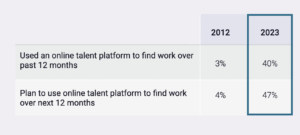
- The average freelancer user uses 3.2 platforms, and 34% of those using platforms say it is their primary source of work. (MBO, State Of Independence, 2023)
Reports
Stats
- Company KPI Related
- Working Without Borders: The Promise and Peril of Online Gig Work
- In the case of NASA:
- the skills of freelancers have met or exceeded expectations in 92% of projects.
- 80% Cost Savings
- Traditional procurement for NASA and other US federal agencies takes on avg 9-12 months, with NASA’s current contract with gig platforms, the whole process for a specific assignment can be completed within 3-4 weeks.
- Working Without Borders: The Promise and Peril of Online Gig Work
- Freelance Marketplace Related
- Grand View Research
- global freelance platforms market size was valued at USD 4.39 billion in 2022
- expected to grow at a compound annual growth rate (CAGR) of 16.5% from 2023 to 2030
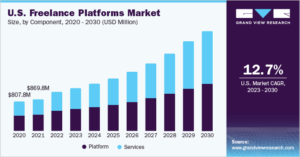
- What skills are growing the most?
- project management segment led the market and accounted for more than 24.3% share of the global revenue in 2022.
the services segment, which Grand View defines as “a range of technological and managed services that pertain to different aspects of freelance work, making it easier for freelancers to connect with clients and providing clients with the necessary tools and support to collaborate with freelancers successfully”, has the highest CAGR (compound annual growth rate) of 18.1%
- second highest growth, web & graphics segment is anticipated to grow at a considerable CAGR of 19.2%
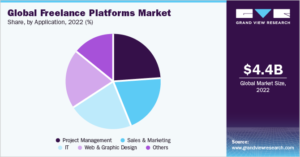
- What regions are growing the most?
- North America led with a revenue share of 31.6% in 2022
- Second, Asia Pacific is expected to grow notably with a CAGR of 18.7%.
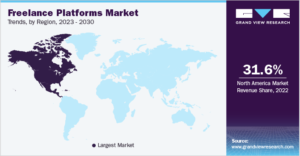
- Jon Younger, The Middle East Is Fast Becoming A Leader In The Freelance Revolution
- Grand View Research
Freelancer Related
Why do freelancers freelance?
According to Flexjobs:
62% of survey respondents said that the flexibility of work schedules was a significant factor in their decision to freelance
56% of respondents to the FlexJobs survey said the general concept of having freedom to make choices that suit their lives was a huge reason to freelance
Growth of the freelance economy?
According to MBO’s The Great Realization
Number of Freelancers grew 34%, from 38.2 million to 51.1 million.
68% of newcomers were Gen Z or millennials, and 55% of newcomers were female
66% of full time freelancers believe they are more secure than traditional workers
78% Say they are healthier working independently
According to Statista
by 2027, 86.5 million people will be freelancing in the United States, the research firm predicts, with freelancers making up 50.9% of the total U.S. workforce
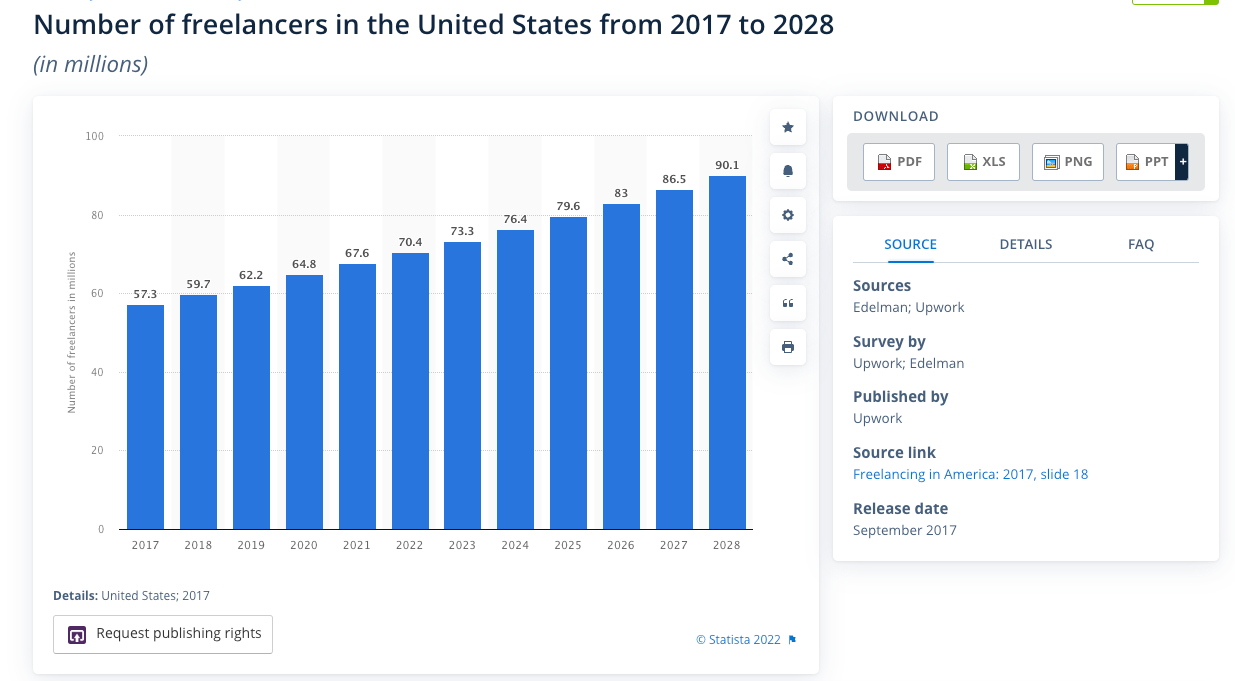
According to Business News Daily
Freelancers earn more than average workers
44% of freelancers made more money than they did when employed at a traditional job
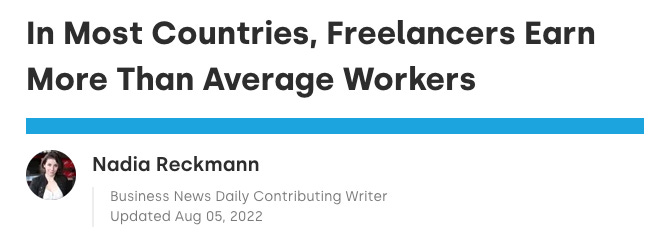
According to Upwork’s Freelance Forward Economist Report
Freelancers contributed $1.3 trillion to the U.S. economy in annual earnings.
53% of all freelancers provided skilled services such as computer programming, marketing, IT, and business consulting in 2021, up from 50% in 2020
56% of non-freelancers say they are likely to freelance in the future
9 in 10 freelancers believe that the “best days are ahead” for freelancing; Two-thirds (67%) say they are optimistic about their career in 2022, compared to 58% non-freelancers
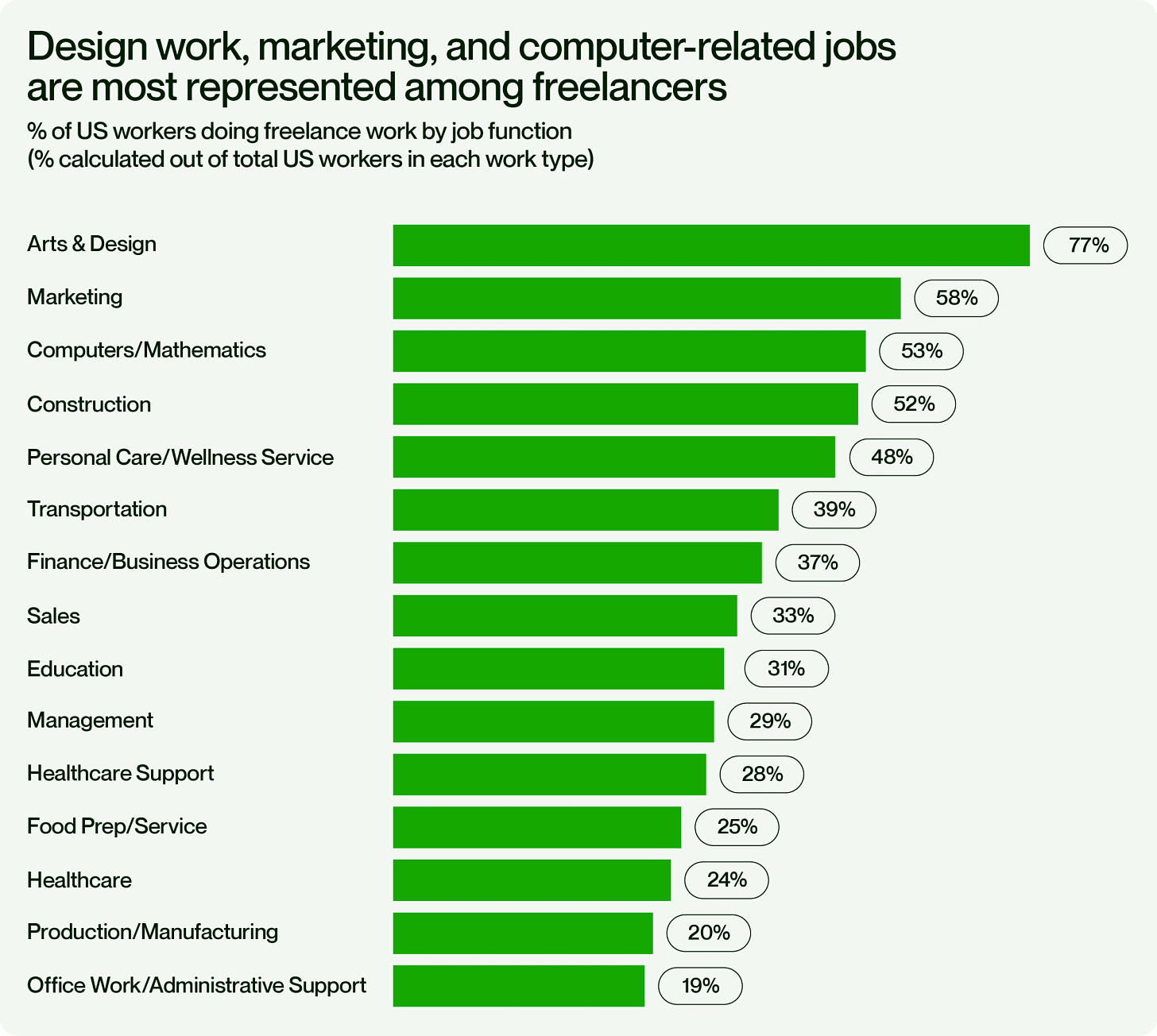

According to Jon Younger and the University of Toronto’s Global Survey On Freelancing
69% of freelancers are loyal to one or two platforms rather than several
30% of freelancers struggle, with 34% of freelancers worrying about their financial performance
According to HBS’s Building The On-Demand Workforce
Almost 90% of business leaders stated that “talent platforms would be somewhat or very important to their organization’s future competitive advantage”
Main challenges of freelancing?
According to Skynova
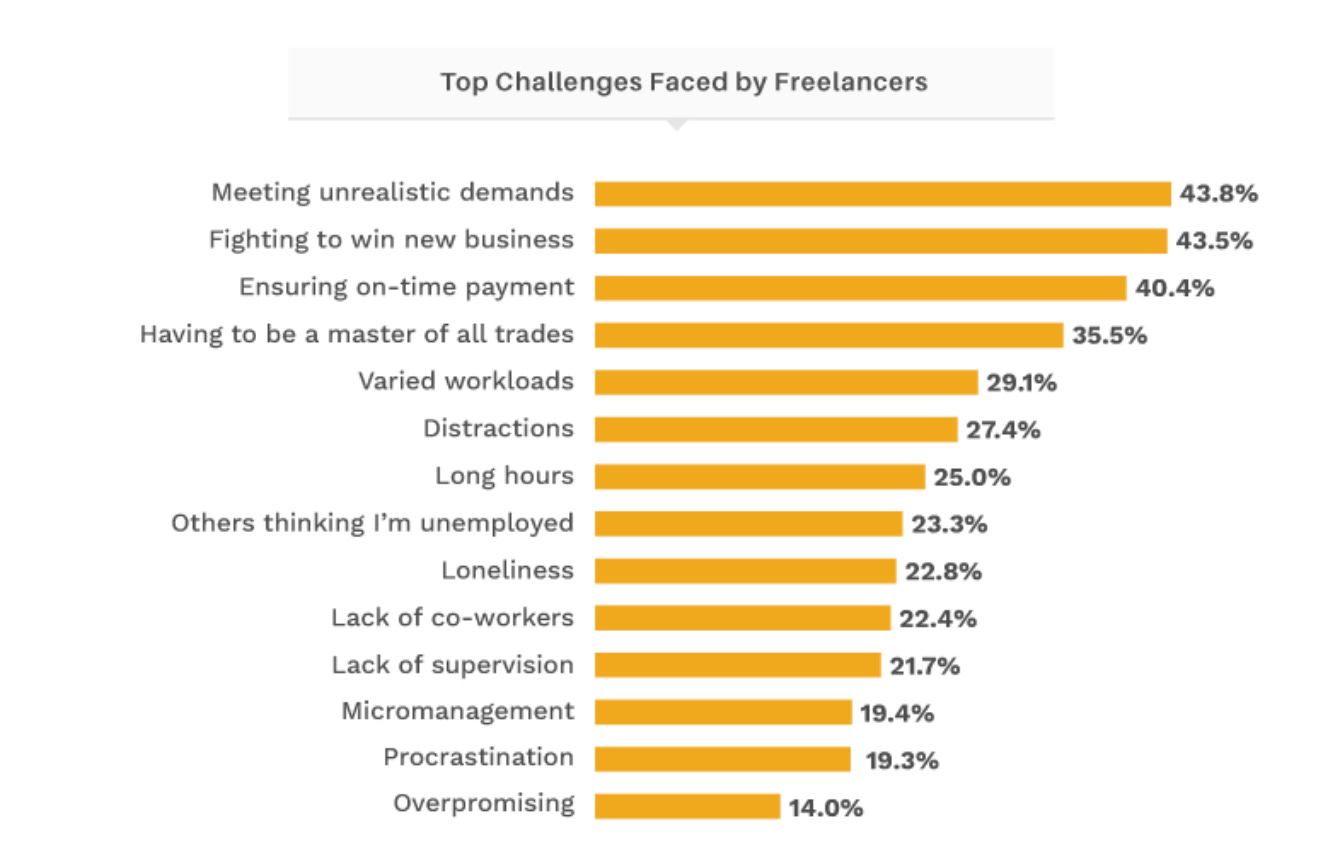
Freelance Acquisition Related
Paro, finance/accounting freelance platform, raised $25m.
Stoke Talent was acquired in under 2 years by Fiverr for $95m.
Braintrust, freelance platform that brands itself a ‘web 3 job board’ raised $100 million through it’s own tokens.
Superside, the closest thing to Uber for freelance design services, raised $30 million.
We Are Rosie, marketing freelance platform, raised at a $100m valuation after growing by 556% in the last year.
Remote/Hybrid Work Related
From Distributed:
90% of employees want continued flexibility in where and when they work
68% of employees would choose remote working options over in-office work
61% of employees would be willing to take a pay cut to maintain remote working status
just 15% of workers would apply for a position that requires total full-time office work
Jason Calcanis LinkedIn Survey
63% said they should embrace a hybrid return to the office where employees choose remote or in-office
~60% of venture capital firms plan to keep a hybrid work model, while just 6% are mandating a return to full-time work in the office.
American Express gives employees the freedom to work from wherever they want for up to four weeks per year through the “Amex Flex” plan
Almost 15% of high-paying job listings are now remote. According to Dan Pink, “that would have been *unthinkable* in October 2019”.
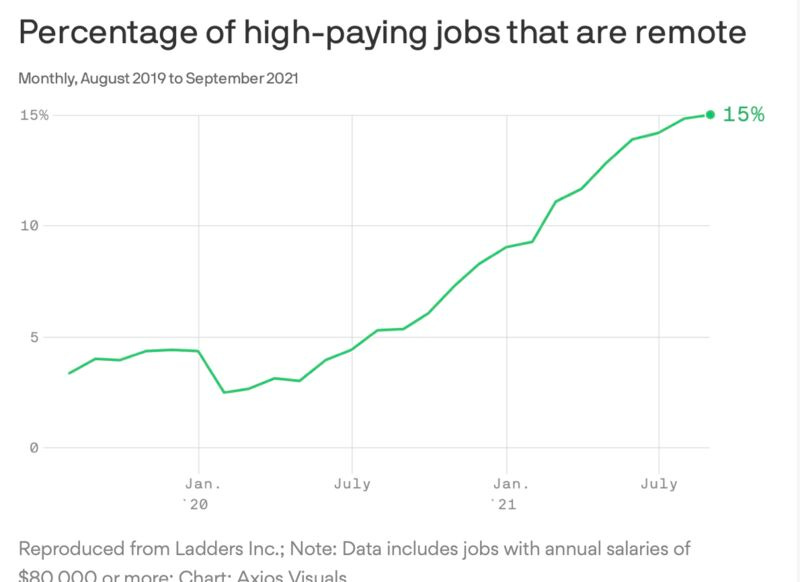
Great Resignation Related
55% of American Workers plan to look for a new job
41% of Workers across the globe are considering leaving their jobs
74% of participants in a LinkedIn study said time spent at home during the pandemic caused them to reevaluate their current work situation
4.5 million workers quit their jobs in November, a new record according to the latest report from the Bureau of Labor Statistics
4.4 million workers quit in September, second straight record month. Thanks for the great chart
David Hanrahan!

4.3 million people quit their jobs in August (2.9% of the U.S. workforce).
- Upskilling Related
- In Deloitte’s Perspective on the future of shared services, they state, “The alternative workforce tends to update their skills more frequently and can typically ramp up within days rather than weeks”.
- 60% of freelancers have updated their skills in the past 6 months, compared to 49% of traditional employees who have updated their skills in the past 12 months.


